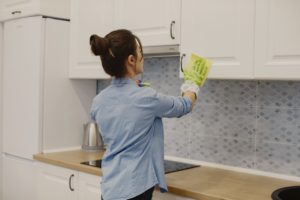F lu season is on its way and you should take some action to keep your household healthy and safe for you and your loved ones. It is certainly not pleasant to be aching all over, sneezing, sniffling, coughing, and overall be miserable thanks to the flu. Fortunately for you, we have some smart tips on how to prevent this from happening to you by flu-proofing your house. By completing those, you will be able to stop germs at your doorstep.
lu season is on its way and you should take some action to keep your household healthy and safe for you and your loved ones. It is certainly not pleasant to be aching all over, sneezing, sniffling, coughing, and overall be miserable thanks to the flu. Fortunately for you, we have some smart tips on how to prevent this from happening to you by flu-proofing your house. By completing those, you will be able to stop germs at your doorstep.
Sanitise surfaces that are being regularly touched – Flu viruses can, in fact, live on hard surfaces for 2-8 hours. Many people can get infected by touching door knobs, light switches, or pretty much anything that is exposed to the public (public transport, shopping malls, etc.). At home, it is important to disinfect surfaces, such as light switches, door handles, remote controls, and faucet handles. The easiest way to do that is by using disinfectant or antibacterial wipes. If you don’t have any wipes at home, you can spray those areas with rubbing alcohol and wipe them away with a paper towel.
Wipe your feet – Viruses and germs can be found in mud, dirt, and debris. When you are walking outside, those will get stuck to the soles of your shoes and eventually end up inside your house. Keep a clean doormat at your front door and wipe your shoes thoroughly before entering your house. Take them off as soon as you walk in and if you want to go the extra mile, wash your shoe soles once a week using hot water and soap.
Cleaning your phone – Phones are hidden hotbeds for germs and microbes. When used on a regular basis, especially outside in public places, your phones collect a lot of germs and microbes. Your hands collect all those from your surroundings, then your phone screen picks them all up. In order to prevent the spreading of those, frequently clean your phone with antibacterial wipes or sprays. During flu season, try to give it a quick wipe every time you use it in public spaces.
Detox your desk – Everyday surfaces such as desks, countertops, and tables easily collect a lot of germs and viruses. Even if you work from home, your desk will still be covered in bacteria. It is best to clean all those surfaces, especially your desk, on a regular basis and disinfect them with rubbing alcohol, disinfectant wipes, or sprays. To prevent those nasty germs from spreading to your hands, give your desk a quick wipe once a day. Make sure you also wipe your keyboard, pens, mouse, and everything else you constantly touch. Avoid serving food at your working desk.
Disinfect the kitchen – Stovetops, countertops, kitchen sink, fridge, and pretty much all areas of your kitchen are breeding grounds for germs. The warm, moist conditions attract more of them and cause them to multiply even faster. Wipe down all your kitchen surfaces daily, and run all your cutting boards and sponges through a sanitising cycle on the dishwasher to prevent further contamination. Replace your kitchen towels and cloths regularly as well.
Stop dragging germs around – Even if you are regularly cleaning your whole place, doing it with cleaning supplies that have not been cleaned will only make the matter worse. If you don’t wash and disinfect your mops, microfiber cloths, and cleaning sponges, there is no point in cleaning. Make sure you regularly take care of the sanitation of your tools. That way you will prevent germs that are already there to be dragged and spread around. After use, wash all supplies with hot water and soap. You can add a drop or two of bleach for some extra disinfection. If you want to be extra safe, switch to disposable cleaning cloths during flu season.
Wash your linens – Your washing machine and dryer can be quite efficient against germs and bacteria. Wash all your towels, sheets, and rugs regularly. When shopping for a laundry detergent, try to get one that has sanitising properties. Use the hottest temperature cycle suitable for the particular fabrics you are washing.
Air filtration – Germs and microbes are easily spread in the air. Once a week, make sure you clean and wipe down your air vents. Especially if you are regularly using your AC or heating system. Clean or change air filters regularly as well. You will reduce the number of viruses that will be released back into your home.
Consider copper – If you are looking for a kitchen sink that will not collect a lot of germs and bacteria, consider getting a copper one. Copper is a warm-colored metal that gives ambiance and a beautiful look to any home. But did you know it also kills bacteria? Copper and copper alloys, including brass and bronze, are proven bacteria busters and can be effective against viruses as well.
